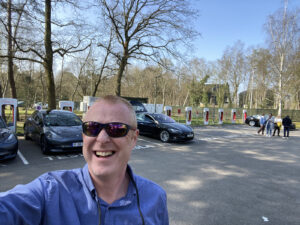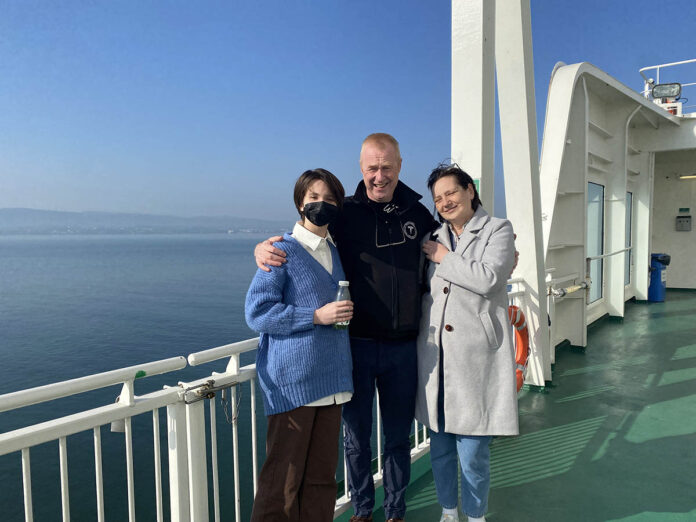AN Ennis man who was part of a convoy of Tesla drivers bringing Ukrainian refugees to Ireland has told how he still gets emotional thinking about the experience.
John Casey, founder of the Tesla Owners Group in Ireland, also revealed the drivers are planning a return trip to help even more people to safety.
John recently returned from Poznan in Poland where he was part of a humanitarian endeavour which saw more than 70 Ukrainians, including a three-month old baby, brought by car across Europe to Ireland.
He explains that fellow Tesla driver and member of the group Tom McEnaney, founder of International Orphanage Development Programme Ltd, approached him last month with the idea of the club helping people in Ukraine.
Having put the word out to the members on Thursday, March 24, a convoy of 15 cars and a van set out for Poznan.
Fellow club member, and director at Unicef, Caroline Dowling flew out ahead of time to liaise with those working on the ground with Ukrainian people to ensure as many people as possible could be helped.
Before heading off, the group paired up with the Ukrainian Crisis Centre, an Irish community of Ukrainians helping their compatriors and they received accreditation from the country’s embassy to Ireland.
John describes the drive to Poznan as an “arduous journey”, with two days of solid driving before arriving at their destination.
As well as picking up their “precious cargo” of people looking for refuge, the drivers also helped to bring the Ukrainian people’s possessions and even their pets to their new home in Ireland.
In John’s car there were two families made up of two mothers with their 14-year-old children.

“We left nobody behind that wanted to come to Ireland. As well as the 72 poor souls who travelled with us, a further 20 came on an aeroplane a couple of days later,” he said.
During their journey back from Poland, John and his fellow drivers got to know more about the people they were helping, despite the language barrier.
“I had no Ukrainian and they had limited English, but we got the gist of how they were feeling about the war and how it wasn’t their war, really sad tales you could glean from them.
“We gave them a pathway to safety and we are proud of that. We were an alternative to planes, trains and buses. Some of these people had dogs, cats and even a rat and they had all sorts of belongings so really the option of an aeroplane wouldn’t be there for them.”
“I know others have also gone out to help them. It was traumatic what they have been through, they are such a beautiful people.”
Helping to bridge the language gap was the music of both Ireland and the Ukraine, he outlined.
“They put on their music, the first thing they put on was a popular Ukrainian song saying ‘It’s not our War’. I could completely sympathise with them around this and it sort of opened up the conversation a bit.
“Their music was a bit folky, so I looked for something we had that we could compare with. I put on a bit of the Kilfenora Céilí Band and Riverdance. We spoke about everything really, they were quite interested in assimilating into Irish life, asking about schools, university, the food, history, you name it and we gave them the full gambit as much as we could.”
The drivers shared stories with each other about the journey, with one telling how a family were so desperate to escape they took a chance on travelling with the convoy despite fears she could be trafficked.
“One mother had two teenage daughters and she took a photograph of the car and driver in Poland and sent it to her husband in Ukraine. Even though we had documentation from the ambassador they weren’t too sure if they would be trafficked but they said they would take a chance, and if they weren’t heard from in a few days then the husband would have the car registration. That is some indication of their state of mind, they were prepared to take a chance.”
Among the passengers was a three-month-old baby with John recalling, “you could nearly see how tensed up he was from the journey he had been on, but then his first day on Irish soil you could see the smile on him.”
The convoy brought the Ukrainian people to Dublin, with John learning that a number of these have now settled in Clare.
Among them is a five-year-old boy set to start school soon who John presented with a hurley and sliotar.
“At least two of the families that were brought back in our convoy ended up in Clare, I’ve met them and they are settling in OK.
“They are lovely people and the Irish people have been so welcome, opening their doors and opening their hearts to them. It is so sad that they have had to flee and they deserve to be treated with a little bit of kindness.”
He believes that for many Ukrainians, Ireland could become their permanent home.
“I would say it’s unlikely some will go back. They have seen so much upset and there is nothing left for them there, it is bombed out of it and their friends and family are scattered to the four winds. It’s heartbreaking for them.”
John said future humanitarian trips are expected in the near future for the club. “Everybody who has gone over there has had the same experience as mine, it’s traumatic and I’m still welling up thinking about it, but this is something that I would do again.
“Would others join? Yes. Is there enough of us out there? Yes, we have 1,400 in our group. Is there a need for people to do this? Yes. These people can’t make the journey on their own means and where we are able to help we will.”
“I would say we will wait until the ferries are quieter after Easter, but absolutely I imagine there will be another convoy.”
The group is continuing to fundraise on GoFundMe


